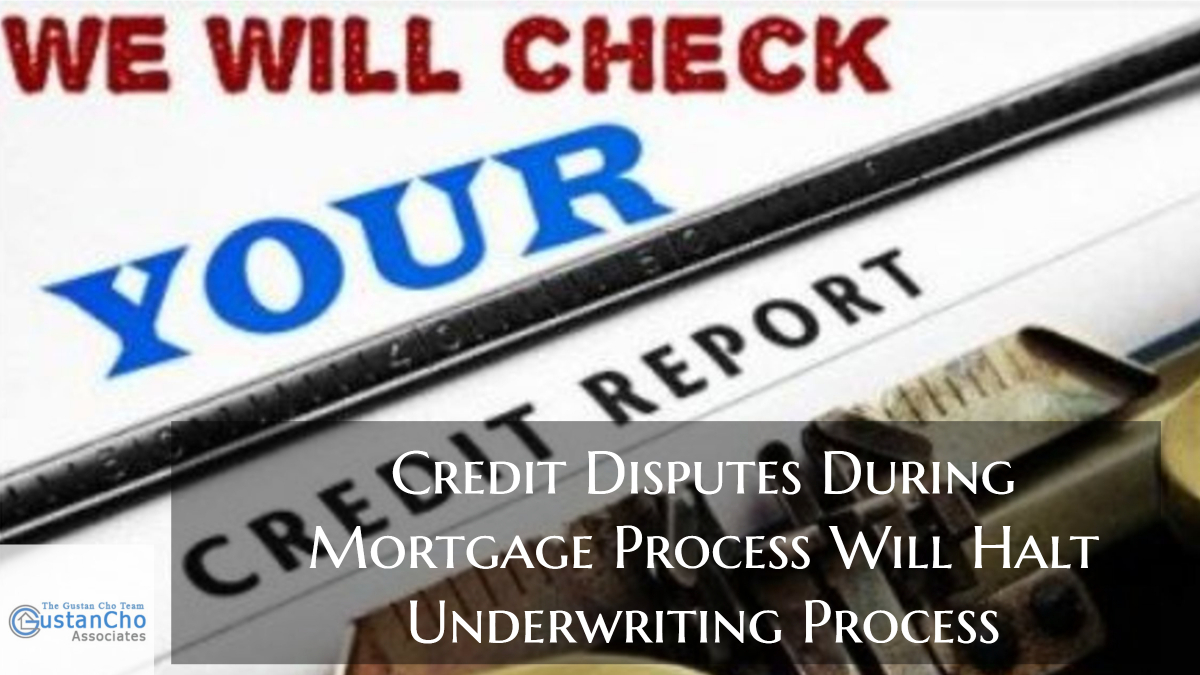In this guide, we will cover how credit disputes during the mortgage process can halt the mortgage process. Credit disputes during the mortgage process may not seem like a big deal. However, it is one of the most negative factors in the application and approval process.
An experienced mortgage loan officer should thoroughly review the mortgage loan applicant’s credit report. They should carefully review the mortgage loan applicant’s credit items and see any credit disputes against derogatory credit items.
Many mortgage loan originators look at the borrower’s 1003 mortgage loan application and the borrower’s credit scores.
Importance of Not Overlooking Credit Disputes
Many loan officers will browse the borrower’s credit report to look at prior bankruptcies, foreclosures, and recent payment history. Overlooking credit disputes can make a file blow up in the 11th hour. Pre-approval letters issued with credit disputes can be considered null and void. Credit disputes are one of the main reasons why a pre-approval turns into a mortgage loan suspense account and mortgage loan denial. This article will discuss how credit disputes during the mortgage process can halt the process.
What Are Credit Disputes During the Mortgage Process?
Credit disputes are often common when a consumer tries to repair their credit. This is often done by disputing a negative item such as a collection account, charge-off, late payments, judgments, or other derogatory items off their credit report by disputing the negative credit item to the three credit reporting agencies.
The way credit disputes work is when you have a derogatory credit item. Consumers write to the credit bureaus stating that the item does not belong to them or it is wrong. The credit reporting agency then notifies the creditor about the credit dispute
The creditor has thirty days to respond to the credit reporting agencies with proof validating the credit dispute. The derogatory stays on the credit report if the creditor validates the consumer’s dispute. If the creditor does not respond in 30 days to the credit bureaus, then by federal law, the credit bureaus need to delete the negative item from the consumer’s credit report.
How Can I Remove Credit Disputes During The Mortgage Process?
In theory, this is how it works. In real life, credit bureaus tend not to remove derogatory items from the consumer’s report even after 30 days of the creditor not getting back to them. The consumer has the verbiage that the credit item is in dispute. This can last many months, and when a derogatory item is in credit dispute, it can halt the mortgage application and approval process.
Exempts Items With Credit Disputes During Mortgage Process
Certain credit disputes are exempt; consumers can dispute them during the mortgage application and approval process. Mortgage lenders classify credit items into two types:
-
- Medical
- Non-Medical
Mortgage Applicants can have credit disputes with medical collection accounts or medical derogatory credit items even if there are unpaid balances. Medical collection accounts are exempt from credit disputes. Medical collection accounts, even those with credit balances, are exempt regarding mortgage loan qualification requirements.
HUD Guidelines On Charged-Off Accounts
Charge-offs are exempt on FHA loans, do not count, and can be ignored by lenders. However, suppose borrowers have a charge-off account with a credit dispute. In that case, the mortgage loan application and approval process will be halted until the credit dispute on that charge-off account has been retracted and removed from the credit report. Borrowers with charge-offs on credit reports should leave it alone because it will not affect them getting an FHA loan. However, the file will be suspended for borrowers with credit disputes on charge-off accounts until the credit dispute has been retracted and removed.
FHA Guidelines On Collection Accounts
FHA does not require the borrower to pay off a collection account with an outstanding balance. However, HUD requires that if the total amount of unpaid non-medical collection account’s balance is over $2,000 that 5% of the outstanding unpaid balance be considered in calculating the borrower’s debt to income ratios. For example, if a borrower has a $10,000 unpaid collection account balance, then 5% of the $10,000 or $500 be used as a monthly expense in calculating the borrower’s debt-to-income ratio even though they do not have to pay it.
If the borrower has a large unpaid collection balance, the 5% calculation will disqualify them due to the high debt-to-income ratios. The borrower can set up a written payment agreement with the creditor. They can agree on a monthly payment, which will be used instead of the 5% factor in calculating the debt-to-income ratios.
This is for non-medical collection accounts only and not medical collection accounts. Medical collection accounts are exempt from the 5% debt-to-income ratio calculation. Charge-offs are also exempt.
Credit Disputes During Mortgage Process Will Halt Process
As mentioned earlier, medical credit disputes with balances are alright and exempt from the credit dispute rules. Charge-offs are okay and will not affect someone qualifying for an FHA loan. However, mortgage applicants cannot have a credit dispute on a charge-off account.
The credit dispute on a charge-off account must be retracted and removed from the credit report before the mortgage process can proceed. With non-medical collection accounts with zero balances, credit disputes during the mortgage process are exempt
It will not affect the mortgage loan process. As long as the total amount of credit disputes is under $1,000, it is exempted from non-medical collection accounts. Any non-medical credit disputes over $1,000 or greater need to be removed before the mortgage loan process can proceed.
Dangers Of Retracting And Removing Credit Disputes
A pre-approval letter with credit disputes will be null and void until the credit disputes are retracted and removed. One of the major issues with retracting a credit dispute is that once the credit dispute is retracted and removed from someone’s credit report, their credit scores will drop. How much will it drop? It depends on each individual.
I have seen someone’s credit scores drop 10 FICO points from retracting a credit dispute. Sometimes, I have also seen someone’s FICO credit score plummet 50 FICO points with just one credit dispute retraction. Potential homebuyers are planning to buy a home soon, make sure to have all of the credit disputes retracted before applying for a mortgage loan. Homebuyers do not want to be in a hurry to purchase and close on a home loan while in a credit repair program.
Home Buyers needing to qualify for government or conventional loans with a direct lender with no mortgage overlays on FHA, VA, USDA, and Conventional loans, please contact us at 800-900-8569 or text us for faster response. Or email us at gcho@gustancho.com. We are available evenings, weekends, and holidays seven days a week.












